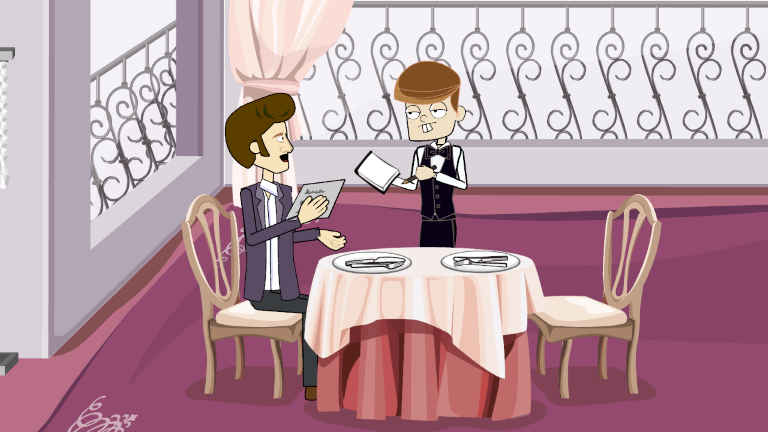Obnoxious CEO: “vous êtes qui?”, “vous imaginez bien”, “je me doute bien”, “ah bah oui!”
Denis Bouley meets the obnoxious and disrespectful Mademoiselle de Colbert, CEO of a large multinational company. She has no clue who he is and what he's here for, even though she recently hired him as her new coach.
Watch this short clip in French. The clip starts at 8:30 (in case it doesn't automatically start there). I highly recommend you first watch it at 0.75x speed.
- Mademoiselle de Colbert, votre rendez-vous...
- Mon rendez-vous... Je peux vous aider?
- A priori c'est moi qui suis là pour vous aider!
- Hum c'est intéressant ça! Vous êtes qui?
- Je... Euh... Denis Bouley... C'est vous qui m'avez embauché...
- Monsieur Bouley, je suis à la tête d'une multinationale employant 62.000 personnes,
alors vous imaginez bien que je ne peux pas connaitre ni reconnaitre tous les gens qui travaillent pour moi.
- Ben oui oui je me doute bien...
- Bon, vous représentez quel syndicat?
- Ah non...
- Syndicat... Non non non moi je suis votre nouveau coach! Coach... Coach...
- Ah oui bien sûr! Ah bah oui! D'accord Monsieur Bouley...
- Oui, voila ce que je...
- Voilà, alors écoutez, mon "coach", là j'ai quelques petites choses à faire, alors vous allez m'attendre tranquillement dans votre bureau.
Il a un bureau, Magali?
- Ah non...
- Bon on va trouver un bureau à Mr. Bouley. Hein un petit bureau pour Mr. Bouley!
Et puis euh je vous appelle dès que j'ai besoin de vous.
- D'accord, très très bien.
- A bientôt!
- A bientôt...
- A bientôt "coach", "coach"...
- A bientôt... oui... D'accord merci...
English version
- Miss de Colbert, your appointment...
- My appointment... Can I help you?
- Well, it seems I'm here to help you!
- Hmm, that's interesting! Who are you?
- I... Um... Denis Bouley... You're the one who hired me...
- Mr. Bouley, I run a multinational employing 62,000 people, so you can imagine I can't know or recognize everyone who works for me.
- Well, of course, I understand...
- So, which union do you represent?
- Oh, no...
- Union... No no no, I'm your new coach! Coach... Coach...
- Ah yes, of course! Oh well, yes! Okay, Mr. Bouley...
- Yes, so what I...
- Alright, so listen, "coach", I have a few things to do, so you'll wait for me quietly in your office. Does he have an office, Magali?
- Uh no...
- Alright, we'll find an office for Mr. Bouley. Right? A nice little office for Mr. Bouley! And then um I'll call you when I need you.
- Okay, sounds great.
- See you soon.
- See you soon...
- See you soon, "coach," "coach"...
- See you soon... yes... Okay, thank you...
Votre rendez-vous!
A courteous way of informing someone, typically in an office setting, that their appointment has arrived or is here to see them.
"Monsieur le directeur, votre rendez-vous."
This is short for:
"Votre rendez-vous est arrivé" or "votre rendez-vous est là".
A priori
"A priori" is a Latin term that's commonly used in French. It refers to knowledge or judgments that are made based on reason or theory rather than on specific experience or observation. It means forming an opinion or assumption before having all the facts.
It can often be translated to "in principle".
For example, if someone says, "A priori, it seems like a good idea," they mean that based on what they know or understand beforehand, they believe it's a good idea, even though they may not have all the details.
In the video, "A priori c'est moi qui suis là pour vous aider" suggests that the coach assumes that in principle, he's the one who is there to help, based on the position he was hired for.
Example:
"Je peux venir avec toi à la conférence?
A priori, ça ne devrait pas poser de problème."
I can come with you to the conference?
In principle, it shouldn't be a problem.
Vous êtes qui?
This means the same as the more formal version "Qui êtes-vous?". However, "vous êtes qui" has a suspicious or hostile connotation:
"Vous êtes qui, vous?"
"Mais vous êtes qui, exactement?"
Who the heck are you?
"Vous êtes qui? Je vous connais?"
Who are you? Do I know you?
"Vous êtes qui pour me parler comme ça?"
Who are you to speak to me like that?
Je suis à la tête...
"I am in charge" or "I am at the head", meaning the person holds a position of authority or leadership.
"Je suis à la tête d'une équipe de chercheurs."
I'm in charge of / I lead / I supervise a team of researchers.
"Elle est à la tête de ce projet."
She is in charge of this project.
Vous imaginez bien que...
The phrase "vous imaginez bien que" is used to imply that something is easily understandable or expected given a particular situation.
So "Vous imaginez bien que je ne peux pas connaître tous les employés!" means it's reasonable to assume she cannot possibly know all the employees.
"Vous imaginez bien que je ne peux pas payer une telle somme!"
You can well imagine that I cannot afford such an amount!
Je me doute bien.
This translates to "Yes, I imagine so".
"A mon âge, je ne pourrais pas courir un vrai marathon!"
"Oui je me doute bien."
At my age, I couldn't run a real marathon!
Yes, I imagine so
"Elle ne veut pas me prêter sa voiture."
"Oui je me doute bien, elle a peur que tu l'abimes"
She doesn't want to lend me her car.
Yes, I imagine so. She's afraid you'll damage it
Ah bah oui!
The phrase "Ah bah oui" is used very frequently in colloquial French with several possible meanings depending on the context.
Here the CEO says "Ah bah oui" in the sense of "well of course!" as she finally remembers who Denis is (the coach she hired). Another common phrase she could have used is:
"Ah mais oui, bien sûr!"
Example:
"Tu te souviens de moi? On était au lycée ensemble!"
"Ah bah oui! Thomas! Comment tu vas?"
The phrase "ah bah oui" can also be used to confirm something emphatically, like saying "oh well yes" or "oh yeah". It means it's something obvious or expected.
"Tu vas à la soirée ce soir?"
"Ah bah oui!"
This means "Yes, of course" or "Yes, for sure" - it's quite obvious you'll be going to the party.
Vous allez m'attendre tranquillement
"You'll just wait for me quietly (in your office)." It's a bossy or patronizing way to tell someone to wait without causing any fuss, as if they have no choice but to obey. It implies you expect them to obediently wait without causing any trouble or disturbance.
"Tu vas t'asseoir tranquillement en attendant qu'il arrive."
You're going to sit quietly and wait for him to arrive.
Un petit bureau pour Mr. Bouley!
"Un petit bureau pour M. Bouley!" is like saying, "Sure, let's give Mr. Bouley a little office," in a tone that's slightly mocking or patronizing, as if talking to a child.
It shows that she doesn't take Mr. Bouley seriously and just wants to get him out of the way.





